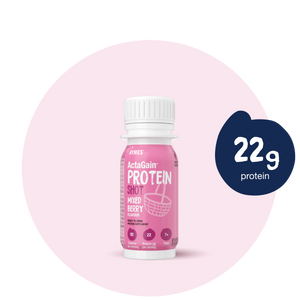
As the life expectancy of people in the UK continues to increase, it is estimated that people aged 65 and over will make up almost a quarter of the population in the coming years.1 Remaining independent and healthy into later life is fundamental for quality of life in older adults and maintaining muscle mass and strength is essential for this.2 Sarcopenia is the decline in muscle mass that occurs as we age and can contribute to an increase in incidents of falls and fractures,3 as well as increasing the length of hospital stays and overall mortality risk.4,5
Why is protein important?
Protein is an important macronutrient for everyone, but research suggests that an increased protein intake is required to maintain nitrogen balance in the elderly in comparison with younger groups.6 Age-related changes in the way the body responds to protein means that more is required to initiate muscle protein synthesis.7 This is coupled with the fact that the rate of protein catabolism generally increases in older adults due to the higher incidences of acute and chronic inflammatory diseases.8 It has been strongly suggested that by increasing protein consumption above recommended levels for the general adult population, this anabolic resistance can be somewhat counteracted.9
What are the recommendations?
In the UK, current guidelines recommend a Reference Nutrient Intake (RNI) of 0.75g of protein per kilogram of body weight per day.10. This does not necessarily account for the increased needs that adults may have as they age.
The European Society for Clinical Nutrition and Metabolism (ESPEN) advises the following:
- 1.2g of protein per kilogram of body weight per day for healthy older adults
- 1.5g of protein per kilogram of body weight per day for older adults who are malnourished or at risk of malnutrition due to illness
- Intakes above 1.5g of protein per kilogram of body weight per day in older adults who have a severe illness or injury.11
What are current intakes like?
A 2020 study concluded that a significant proportion of older adults were not meeting current UK protein intake recommendations and even fewer were meeting the ESPEN healthy older adults recommendation.7 These findings highlight that the older adult population isn’t consuming adequate protein to maintain muscle mass and slow the progression of sarcopenia. This is before additional factors which can impact on protein intake have been considered, such as acute and chronic illness and age-related changes in appetite.
How can protein intake be optimised?
- Include a source of protein at each meal to ensure a steady intake throughout the day:
- Breakfast tends to be a carbohydrate rich meal so this is a great opportunity to introduce some protein e.g. swap a bowl of porridge for some scrambled eggs and toast. - Increase overall protein intake by having protein-rich snacks throughout the day:
- Cheese & crackers, yoghurts, and nuts are all great options - Fortify meals and snacks if struggling with appetite
- Add skimmed milk powder, milk, and cheese to things such as soups and sauces to boost protein intake without increasing the portion size. - Consider oral nutritional supplements (ONS) if struggling to meet protein needs
- ONS can be used to supplement the diet and there are wide variety available to suit individual needs.
What else can help?
Keeping active! Muscle protein synthesis is stimulated by exercise, and recent research highlights that consuming sufficient protein and participating in regular low intensity exercise may be a potential strategy for slowing the sarcopenic process.12 In addition, physical activity can help regulate appetite in older adults13 so including daily activity can work well on conjunction with advised dietary advice.
















